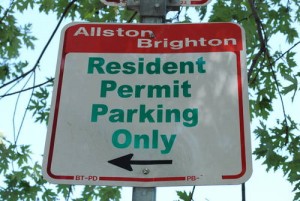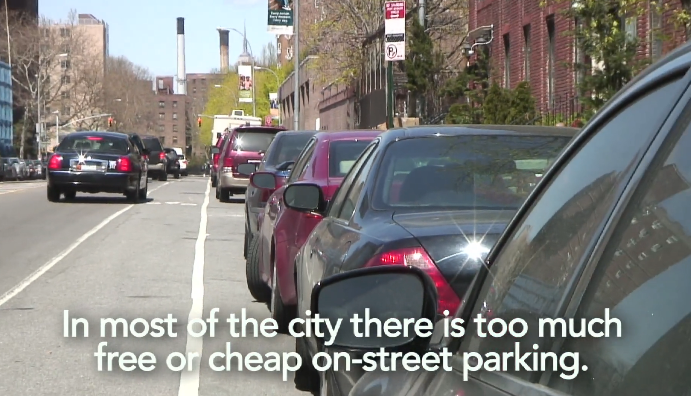New York's three million free parking spaces — about 20 square miles and 7 percent of all city land — are by all accounts grossly underpriced for some of the world's most-valuable real estate.
Depending on the time of day, even the most coveted spaces may be used for free by any driver — a custom that subsidizes car ownership and driving in the city with America's densest public transit and contributing to the carnage, congestion, pollution, and road rage on our streets.
The fundamental imbalance in our parking market also inspires what some call "parking psychosis" — a condition in which entitled drivers think that the city owes them space for free car storage in the public right of way.
Into this context, one neighborhood near Midtown is injecting an idea to rationalize its parking situation in advance of the 2021 introduction of congestion pricing in the city's central business district.
Community Board 7's Transportation Committee resolved in May to end free parking on the Upper West Side in favor of a system of permitted residential parking, as a way to prevent suburban drivers from clogging local curbs as they seek to avoid the congestion zone. (The board's chairwoman tabled the issue, pending a deeper discussion, until October.)
Board members immediately encountered "parking psychosis," as outraged local car owners have inundated meetings complaining about the loss of their entitlement. The car-owning minority also gained a champion in the New York Post, which recently accused Council Speaker Corey Johnson of scuttling his potential mayoral bid because he said that "there are too many parking spaces in New York City."
So is it time for New York to implement a residential-parking permit system?
We've been here before
Mayor Bloomberg certainly thought parking permits could help. He proposed such a system in 2008 as part of his ill-fated congestion-pricing plan, and the City Council tried to revive the idea in 2011 and as late as last year, as congestion-pricing legislation passed in Albany.
“New York City is the only major city in the country that doesn't have some element of a residential-parking permit program,” said Council Member Mark Levine, who in 2018 proposed legislation to create permit parking in northern Manhattan. “With congestion pricing coming, the problem of non-residents abusing the free parking available in Upper Manhattan is going to go from bad to worse. Residential permitting would ensure that curbside space is dedicated to be used by members of our communities and not commuters dodging congestion fees. Why would commuters from New Jersey take public transit if they can get around congestion pricing by parking for free in Upper Manhattan?”
Permitted parking would offer New York manifold benefits:
- It would reduce or eliminate nonresidents’ ability to park in the dense neighborhoods just outside the congestion pricing zone (the goal of the Upper West Side initiative).
- It would force residents who want permits for their cars to register them in-state, curtailing widespread registration fraud and returning the monies lost through it to the state.
- It would raise revenue that the city could use for street-safety measures.
Other cities do it
Permitted parking is common in Boston, Chicago, San Francisco, Washington, Los Angeles, and even the Hamptons — where many New Yorkers’ cars can be found at public beaches with resident-parking stickers affixed to their windshields. So it pays to put aside the hypocrisy and the angst and look at how other cities do it.
But an examination of permit systems around the country shows that they shouldn’t be established without careful planning and competitive, demand-driven pricing. Most large cities that introduced them in the 1970s now face political fights over expanding permit areas and raising prices.

Residential permits could succeed here if they are priced high enough to properly value New York’s scarce public space, said Zhan Guo, an associate professor of urban planning and transportation policy at NYU. London, Vienna and Amsterdam — which charge hundreds of dollars annually per space and actively seek to reduce car ownership as a sustainable transportation policy — present better models than American cities.
High fees would more effectively manage residents’ demand, and could even produce considerable revenue. He noted that the cost of policing a comprehensive and complex parking regime itself would justify charging prices close to market rates.
“It will be a big opportunity missed if [residential permitting] is designed as only an exclusionary measure,” Guo said.
Permits for residential parking originated in the late 1960s and early 1970s, when suburbanization had grown so much that commuters poured into city centers, overloading the parking in downtown areas on business days and driving up prices at garages. In response, drivers from the newer, distant suburbs began parking for free in older, streetcar suburbs — and walking or taking transit for the last few miles to the central business districts.
In those days, residential permits were created as the opposite of a progressive, pro-streets agenda; rather, homeowner associations sought to slow growth, reduce density, and maintain “neighborhood quality” by keeping out outsiders of other races or classes.
Today, owing to their conservative origins, most American residential-permit districts charge way too little. In Los Angeles, annual fees are $34 per car; in Chicago, $25; in San Francisco, $144; and in Washington, D.C., $35. Boston charges no fee, although its city council is weighing a proposal to charge $25 a year for the first car, $50 for the second car, and so on. Greater Washington notes that its fees cost far less than it costs to maintain the pavement under each parking spot! (When Bloomberg last talked about permit fees, he said that they should be "in line" with those of other cities across the country. That would be a huge missed opportunity.)
The downsides
Drawbacks of residential parking permits include:
- Low fees can incentivize resident drivers to use the curbs instead of garages.
- Reserving too many spaces solely for residents, in a neighborhood like the Upper West Side in which only 24 percent of households own a car, might encourage more car ownership because there would be more spaces at a nominal fee.
- Cities' lack of enforcement against non-permit holders parking in permitted areas — it’s easier and more lucrative to ticket meter-violators in central business districts — can lead to conflict and even to vigilante-style violence between residents and outsiders.
A veteran of earlier city residential-permit fights, who asked to remain anonymous because he now works for the governor, stressed the importance of finding political support for such initiatives; in particular, residents living near districts that have seen an influx of businesses because of up-zoning, such as Downtown Brooklyn or Long Island City, understand the benefits of banishing commuters from the curbs.
Still, it may be too politically difficult to charge full market price for annual permits — Upper West Side garages charge $5,000 to $10,000 annually for a space — but even charging 10 percent of such an amount would reduce demand for street parking and prices at garages in all but the most wealthy neighborhoods, as people sold their cars or left them at their weekend homes. As the example of Amsterdam shows, high permitting fees — say $400 to $500 a year, with a cap on the number of cars a family can have — can discourage car ownership. Some Amsterdam neighborhoods have long waiting lists.
New York City could try to balance the needs of residents and reduce congestion and cruising by dividing neighborhoods' free parking among permitted parking (perhaps favoring disabled residents), market-rate metered parking, and bigger freight-loading zones.
But for such a program to succeed, the city must implement it in every Manhattan neighborhood, based on existing demand. Our zoned system for metered parking now takes demand into account, for example, charging more per hour to park in Midtown than in Washington Heights. Market pricing for residential permits could be determined by the number of people applying and how much they are willing to pay. That's Donald Shoup 101.
Of course, in an ideal world we might get rid of parking entirely and re-engineer our streets for people, not cars, but permitted parking could be a good first step in that direction.
In sum, permitted parking is no panacea, but it offers a way for the city to regulate its curbs and extract revenue from drivers, one of society's most privileged and subsidized groups. It is only justice when, in most neighborhoods, 80 to 90 percent of the public road space is set aside for the movement and storage of privately owned vehicles.
Will New Yorkers try it? We'll see. The full board of CB7 will vote on the matter in October.






